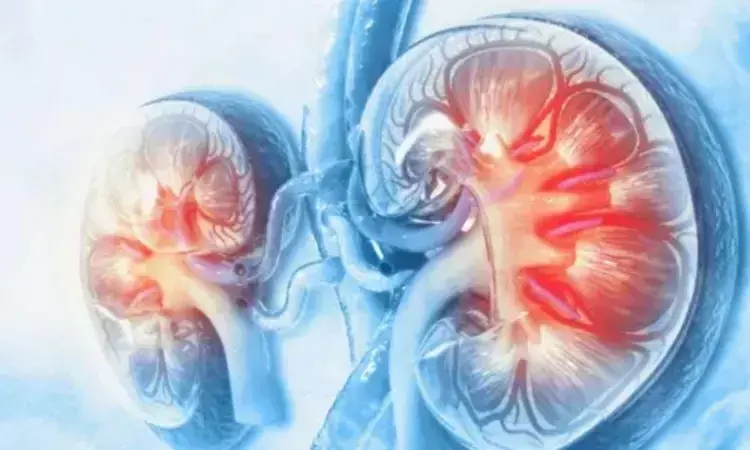- Home
- Medical news & Guidelines
- Anesthesiology
- Cardiology and CTVS
- Critical Care
- Dentistry
- Dermatology
- Diabetes and Endocrinology
- ENT
- Gastroenterology
- Medicine
- Nephrology
- Neurology
- Obstretics-Gynaecology
- Oncology
- Ophthalmology
- Orthopaedics
- Pediatrics-Neonatology
- Psychiatry
- Pulmonology
- Radiology
- Surgery
- Urology
- Laboratory Medicine
- Diet
- Nursing
- Paramedical
- Physiotherapy
- Health news
- Fact Check
- Bone Health Fact Check
- Brain Health Fact Check
- Cancer Related Fact Check
- Child Care Fact Check
- Dental and oral health fact check
- Diabetes and metabolic health fact check
- Diet and Nutrition Fact Check
- Eye and ENT Care Fact Check
- Fitness fact check
- Gut health fact check
- Heart health fact check
- Kidney health fact check
- Medical education fact check
- Men's health fact check
- Respiratory fact check
- Skin and hair care fact check
- Vaccine and Immunization fact check
- Women's health fact check
- AYUSH
- State News
- Andaman and Nicobar Islands
- Andhra Pradesh
- Arunachal Pradesh
- Assam
- Bihar
- Chandigarh
- Chattisgarh
- Dadra and Nagar Haveli
- Daman and Diu
- Delhi
- Goa
- Gujarat
- Haryana
- Himachal Pradesh
- Jammu & Kashmir
- Jharkhand
- Karnataka
- Kerala
- Ladakh
- Lakshadweep
- Madhya Pradesh
- Maharashtra
- Manipur
- Meghalaya
- Mizoram
- Nagaland
- Odisha
- Puducherry
- Punjab
- Rajasthan
- Sikkim
- Tamil Nadu
- Telangana
- Tripura
- Uttar Pradesh
- Uttrakhand
- West Bengal
- Medical Education
- Industry
Nutritional status scores Linked to 30-Day Mortality in Patients with Acute Kidney Injury

New research illuminates the importance of nutritional indices, particularly the Prognostic Nutritional Index (PNI) and Geriatric Nutritional Risk Index (GNRI). These indices play a crucial role in predicting the risk of 30-day mortality in patients diagnosed with acute kidney injury (AKI). This study addresses a previously unvalidated aspect concerning the prognostic value of these nutritional indices in assessing in-hospital mortality risk for AKI patients.
This study was published in BMC Nephrology by Tingting Gao and colleagues. In this retrospective cohort study, demographic and clinical data from 863 adult AKI patients were sourced from the Medical Information Mart for Intensive Care III (MIMIC-III) database spanning the years 2001 to 2012. Univariate and multivariate Cox proportional regression analyses were employed to investigate the correlation between PNI and GNRI and 30-day mortality. The primary evaluation metrics were hazard ratios (HRs) and 95% confidence intervals (CIs). Additionally, subgroup analyses were conducted based on age, Sequential Organ Failure Assessment (SOFA) score, and Simplified Acute Physiology Score (SAPS-II).
- The study revealed that out of the total patient cohort, 26.71% (222 patients) succumbed within 30 days.
- After meticulous adjustment for covariates, it was observed that individuals with PNI values ≥ 28.5 [HR = 0.71, 95% CI: (0.51–0.98)] and GNRI values ≥ 83.25 [HR = 0.63, 95% CI: (0.47–0.86)] exhibited a significantly reduced risk of 30-day mortality.
- This association held true even for patients aged ≥ 65 years. Notably, a higher PNI level correlated with a reduced risk of 30-day mortality in patients with SOFA scores < 6 or SAPS-II scores < 43.
- Conversely, elevated GNRI values were associated with decreased 30-day mortality risk among patients with SOFA scores ≥ 6 or SAPS-II scores ≥ 43 (all p < 0.05).
Key Findings
- The Prognostic Nutritional Index (PNI) and Geriatric Nutritional Risk Index (GNRI) have emerged as potential predictors of 30-day mortality in patients with acute kidney injury (AKI).
- Patients with higher PNI and GNRI values had a notably reduced risk of 30-day mortality.
- These associations remained consistent for elderly patients aged ≥ 65 years.
- PNI appeared to be more indicative for patients with mild AKI, while GNRI showed stronger predictive value for those with severe AKI.
These findings underscore the clinical importance of nutritional status assessment in AKI patients, particularly in identifying individuals at a higher risk of short-term mortality. Further research may delve into optimising the use of PNI and GNRI as prognostic tools tailored to the severity of AKI.
Reference:
Gao, T., & Yu, X. (2023). Association between nutritional status scores and the 30-day mortality in patients with acute kidney injury: an analysis of MIMIC-III database. BMC Nephrology,2023;24(1). https://doi.org/10.1186/s12882-023-03329-5
Dr Riya Dave has completed dentistry from Gujarat University in 2022. She is a dentist and accomplished medical and scientific writer known for her commitment to bridging the gap between clinical expertise and accessible healthcare information. She has been actively involved in writing blogs related to health and wellness.
Dr Kamal Kant Kohli-MBBS, DTCD- a chest specialist with more than 30 years of practice and a flair for writing clinical articles, Dr Kamal Kant Kohli joined Medical Dialogues as a Chief Editor of Medical News. Besides writing articles, as an editor, he proofreads and verifies all the medical content published on Medical Dialogues including those coming from journals, studies,medical conferences,guidelines etc. Email: drkohli@medicaldialogues.in. Contact no. 011-43720751


